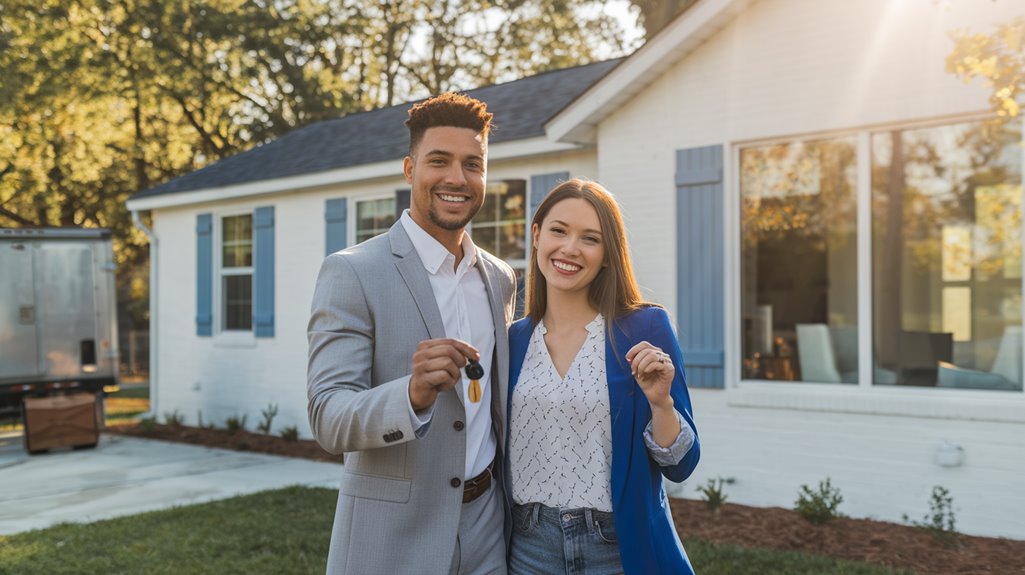Getting your first small home can be a great way to save money and start building your future. You only need to put down 3% to buy it – much less than the 20% needed for bigger homes. Each month when you make a payment, you own more of your home. When you rent, your money just goes to someone else.
Think of your home like a piggy bank that grows over time. A $300,000 home often gains about $9,000 in value each year. After five years, your home could be worth much more than what you paid.
You also save money on taxes. The bank charges you interest on your loan, but you can get $2,000 to $4,000 back on your taxes each year. There are also special programs that can help you save money when you first buy your home.
When you add up all these good things – saving on taxes, owning more of your home each month, and your home getting more valuable – you end up with more money in your pocket.
Ready to start building equity in your own Michigan home? Get your personalized home loan quote today.
Building Equity From Day One
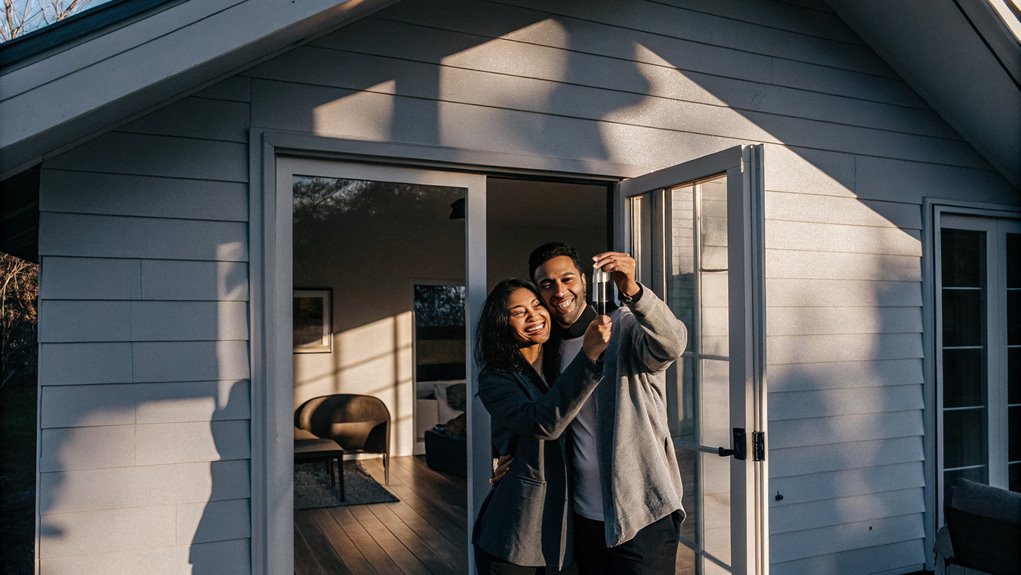
Buying your first home helps you save money right away. When you make your monthly payments, part of the money goes to owning more of your home. Think of it like filling up a piggy bank – each month you own a bigger piece of your house.
Your home savings grow in two ways. First, when you pay your monthly bill, you own more of your house. Second, houses often gain value over time, just like a garden grows. If you buy a house for $300,000, it might be worth $9,000 more next year.
When you rent, your monthly payments just go to your landlord. But when you own a home, your payments help you own more of your house.
After one year of owning a home, you could have saved $15,000 to $20,000 in house money.
Michigan residents, unlock the door to your new home. Request your home loan quote from Treeside Financial today.
Lower Down Payment Requirements
Owning a home is easier than ever before. You don't need a huge pile of money to start. Now you can buy a home with a small down payment of just 3% or 3.5%. On a $250,000 home, you only need to save $7,500 to $8,750 to get started.
If you're buying your first home, you have even more help. Are you a veteran? You mightn't need any down payment at all.
Do you want to live in the country? Special USDA loans let you buy with no money down. Many states will help you too. They can give you money or a cheap loan to cover part of your down payment.
Thanks to all these choices, you can become a homeowner much sooner than you think.
Manageable Monthly Costs
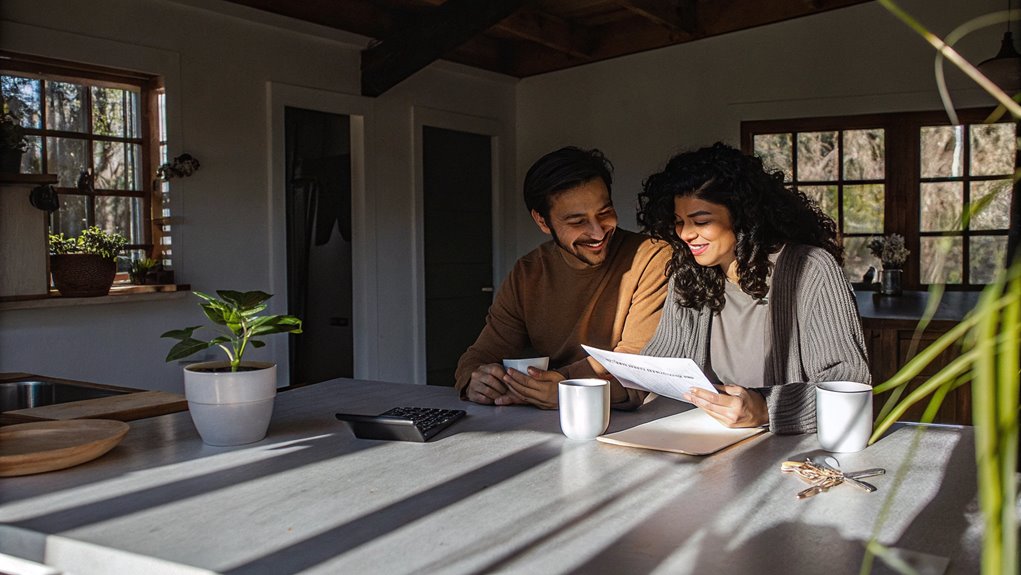
Buying your first home can save you money right from the start. You only need to put down 3-5% of the price. This is much better than paying 20% for a bigger house.
Your tax bill stays low too. Small homes cost less, so you pay less in taxes. When you get a fixed-rate loan, you know what to pay each month.
Most people pay $800-1,200 each month, but this changes based on where you live and what your house costs.
Lower Down Payment Required
Getting into your first home is easier than you think. You only need to save 3-5% for a down payment instead of 20%. On a $200,000 home, this means paying $6,000-$10,000 upfront instead of $40,000.
You have many choices to help you buy with less money down. FHA loans need just 3.5%. Some regular loans ask for only 3% down. If you served in the military, VA loans mightn't need any down payment at all.
Yes, you'll pay extra each month with a smaller down payment. This is called PMI.
But once your home is worth more and you've paid enough of your loan, the PMI goes away. This helps you buy a home now instead of waiting years to save more money.
Affordable Property Taxes
Buying a starter home means paying less in property taxes since smaller homes cost less.
Think of it this way – if your home costs $200,000, you might pay $2,000 to $4,000 each year in taxes. But a bigger $500,000 home could cost you $5,000 to $10,000 in taxes each year. Where you live makes a big difference in how much you pay.
With a starter home, you save money on taxes each month. This means you may have $250 to $500 more in your pocket to spend on home fixes and bills.
As a first-time buyer, you might also get special tax breaks. These tax breaks could cut your taxes by 10-20%. Ask your local tax office if you can get these savings.
Fixed Monthly Payments
Your home payments stay the same each month when you get a basic house loan. This means you pay the same amount for 30 years. You can plan better when you know what to pay each month.
| Monthly Cost Type | Starter Home | Larger Home |
|---|---|---|
| Mortgage Payment | $1,200 | $2,400 |
| Property Taxes | $250 | $500 |
| Insurance | $100 | $200 |
Rent can go up each year, but your house payment won't. Even if your house is worth more later, you still pay the same basic amount. Only your taxes and insurance might change a little bit. When you start with payments you can handle, you can save money and live well too.
Learning Property Ownership Basics
Buying your first home is a big step. Many people like you want to own a home to build a better life. Let's break down what it costs to own a home in simple terms.
When you own a home, you pay more than just your house payment. You need to know about:
Property Taxes
- You pay these once a year
- They cost between $5 to $25 for every $1,000 your home is worth
- The cost depends on where you live
Home Insurance
- Keeps your home safe if something bad happens
- Most people pay about $1,200 each year
- The cost changes based on where you live and what you want covered
HOA Fees
- Some homes are in special neighborhoods
- If yours is, you may pay $200-300 each month
- This money helps keep the neighborhood nice
Know these costs before you buy. This way, you can make sure you have enough money to pay for everything.
Tax Benefits for First-Time Buyers
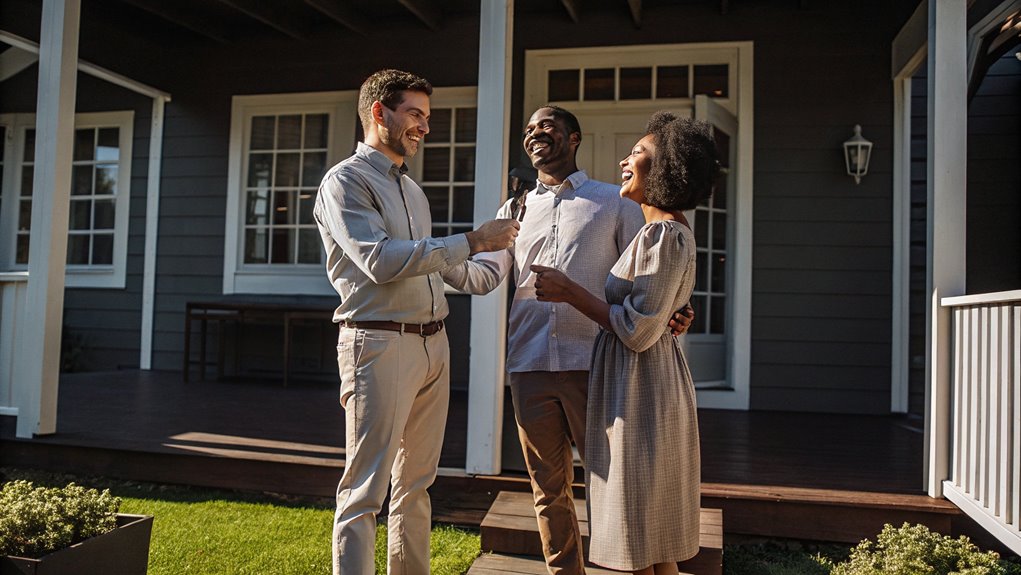
Buying your first home can help you save money on taxes. You can save between $2,000 to $4,000 each year. When you pay your mortgage, you can get money back on the interest you pay. This works for homes that cost up to $750,000.
You can also get money back on the property taxes you pay, up to $10,000.
Your state wants to help you buy your first home too. They can give you back between $2,000 to $10,000 in your first year as a homeowner. If you paid less than 20% for your down payment, you can also save money on your mortgage insurance costs.
Keep all your papers from buying and owning your home. Ask a tax helper who knows about homes to help you get all your tax savings. They'll make sure you don't miss any money you can get back.
Investment Potential in Starter Neighborhoods
Buying a home in a starter neighborhood is a great way to grow your money. These friendly areas are perfect for your first investment because they're less expensive and offer good returns.
Think of starter neighborhoods like a garden. Plant your money here, and it can grow 4-6% each year. That's more than keeping cash in the bank!
Here's why these neighborhoods help you build wealth:
- Houses cost less – about one-third cheaper than other parts of the city
- Renters love these areas – you can earn 8-12% of your investment back each year
- You pay less in taxes – saving you money every month
Young people want to buy their first homes in these areas. This means your investment can grow over time as more people move in.
The best part? Big investors often skip these neighborhoods. This gives you a better chance to find good deals and make smart choices with your money.
Affordable Home Maintenance Practice
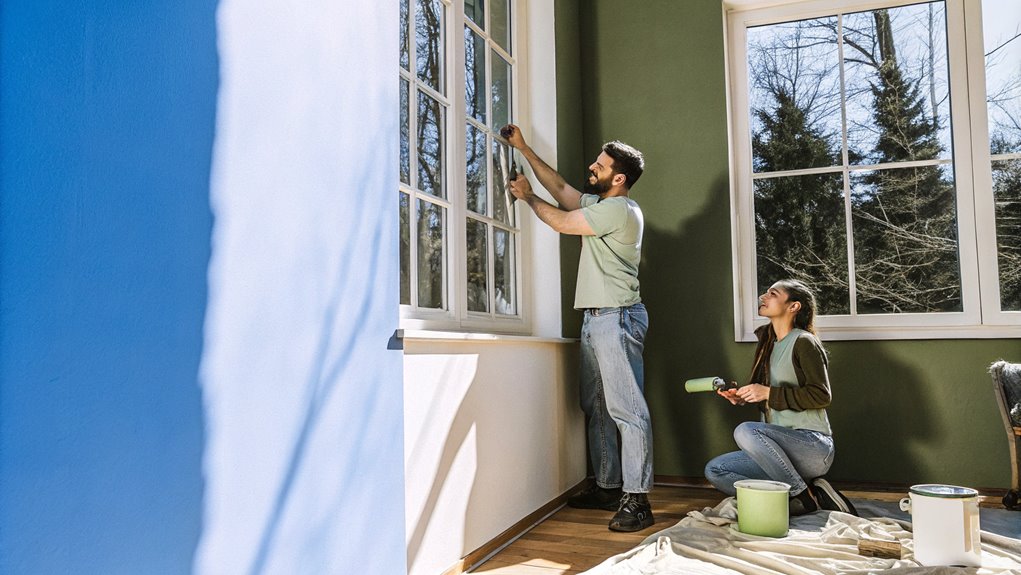
Taking care of your home doesn't have to break the bank. You can save about $2,000 every year by doing simple things.
Make a list to check your home each month. Look at your heating, water pipes, and power. This helps you find small problems early. When you fix them fast, they cost less.
Meet people in your area who like to fix their own homes. They can teach you how to do easy jobs like:
- Clean clogged drains
- Put in new air filters
- Stop cold air from coming in
When you do these jobs yourself, you save money. A repair person costs $75 or more per hour.
Put some money away each month for your home. If your home cost $200,000, save $167 every month. This money will help you pay for fixes when you need them. It keeps your home in good shape for years to come.
Market Entry Timing Advantages
When you buy a home at the right time, you can save lots of money in three big ways.
First, you own more of your home faster by making payments to yourself, not a landlord.
Next, you can pay less for the house if you buy when prices are low, like in winter or during slow times. You might save 10-15% off the price tag.
Last, you can get a better deal on your home loan with lower rates. This means smaller monthly payments that add up to big savings over time.
Build Equity Early On
Buying your first home when you're young helps you save money faster. Instead of paying rent to someone else, your monthly house payments help you own more of your home. Plus, homes often go up in value over time, which means more money for you.
Your house payments do two good things:
- They give you a place to live
- They help you own more of your home each month
When you pay your house bill:
- About $200-300 goes toward owning more of your home in year one
- This amount gets bigger each year
- Your home may gain $9,000 or more in value each year
You can use the money you've built up in your home later on:
- To buy a bigger home
- To fix up your current home
- To help with big costs
The sooner you buy a home, the more time you have to build up money in it. This can help you move to a better home later.
Avoid Market Price Peaks
When buying your first home, wait for prices to drop to save lots of money. Just like shopping for sales at stores, you can find better deals on homes when fewer people are looking to buy.
Look for signs that home prices might go down soon. When banks charge more for loans, or you see more "For Sale" signs in an area you like, prices often drop.
Winter is also a good time to look since most people don't want to move in cold weather.
Find a helper who knows about first homes. They can spot good deals and help you pay less for your dream home.
Think of them as your guide to finding the right house at the right time.
Lock In Lower Rates
Getting a better rate on your home loan can help you save money right now. When the market isn't doing well, banks often drop their rates. This means you pay less each month.
Think of it like getting a good deal at the store – you want to buy when prices are low.
If you buy a first home now, you might get a 4% rate instead of 6%. This makes a big change in what you pay each month.
Here's why it matters:
- If you borrow $250,000, paying 1% less saves you $150 each month
- Lower rates help you own more of your home faster
- You can always get a new loan later if rates drop more, but you can't go back in time to get today's low rates
Take action now. Getting a good rate today helps you save money for years to come.
Rental Income Possibilities
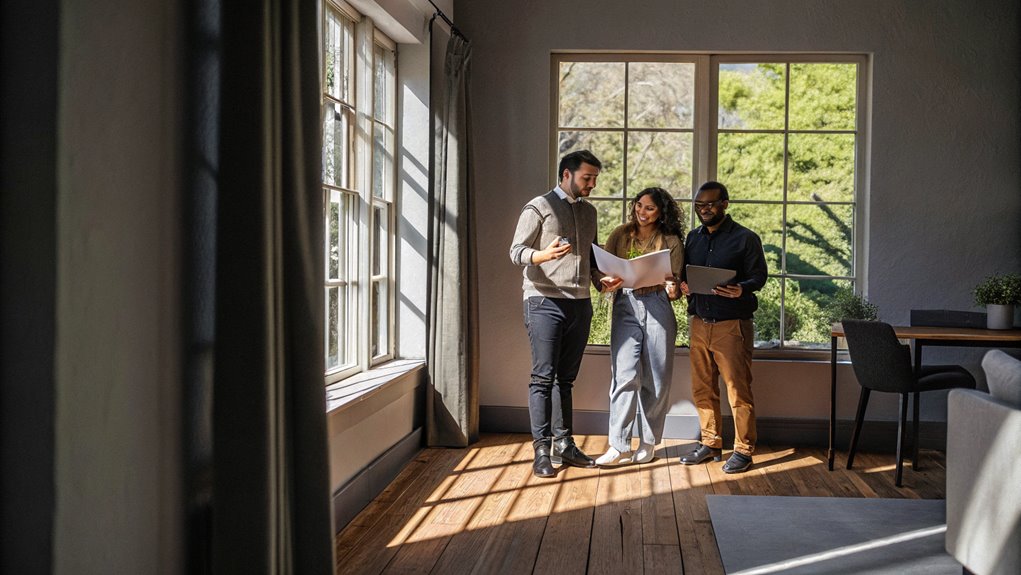
Want to make money from your first home? You can! Many people rent out parts of their home to help pay their bills.
If you have a spare room or basement, you can let someone live there. This can give you $500 to $1,000 more each month. That's a big help with your house payment!
Another way is to turn a room into a short-term rental on Airbnb. You can make more money this way than with a regular renter. But first, make sure your town and house rules allow it. Look up what other people charge in your area.
When you rent out space, you can pay off your home faster. You also learn how to be a landlord.
Later, when you buy a bigger home, you can keep your first house and rent it all out.
Smaller Space, Smaller Bills
Living in a smaller home helps you save money each month.
You'll use less energy to heat and cool your home. Your lights won't need to run as much.
Since your home is smaller, you'll pay less in taxes too.
When things break or need fixing, it costs less because there's less to fix.
It's that simple – a small home means small bills!
Lower Monthly Utilities
Moving to a smaller home helps you save money on your bills. When you have less space to take care of, you pay less for power and heat. Your air conditioning and heater don't have to work as hard. You also need fewer lights in a small home.
Let's look at the numbers:
- A small 1,400-square-foot home costs about $175 each month for power and heat
- A big 2,400-square-foot home costs about $290 each month
- Adding a smart control for your heat and air can save you more money
- Using fewer lights saves you $15-20 every month
When you add it all up, living in a small home saves you about $1,400 each year. You can use this extra money to save for things you need or want later.
Reduced Property Tax
Owning a small home can save you money on property taxes. Property taxes are fees you pay to your local government based on how big and valuable your home is. The bigger your home, the more you pay.
Let's look at the numbers:
- A small 1,400 square foot home might cost you $2,160 in taxes each year
- A big 4,000 square foot home could cost you $6,240 in taxes each year
By picking a smaller home, you can save between $1,260 to $4,080 on taxes every year.
Think about what you could do with that extra money! You could:
- Save it for emergencies
- Put it away for when you retire
- Use it for fun things your family enjoys
The choice is simple: a smaller home means more money stays in your pocket.
Less Maintenance Cost
A small home costs less to take care of than a big one. You won't need to spend as much money to keep it running well. Most small homes are 1,000 to 1,500 square feet, which is much smaller than regular homes that are 2,400 square feet.
When you have a small home:
- Your heating and air system will last longer because it doesn't have to work as hard
- Simple fixes like new paint and floors cost less since there's less space to cover
- Tasks like cleaning gutters and washing the house are easier and cheaper
You can save up to $5,000 each year just by living in a small home. That's money you can use for other things you need or want.
Your small home will be cozy and easy to care for, making your life simpler and your wallet happier.
Future Property Trading Power
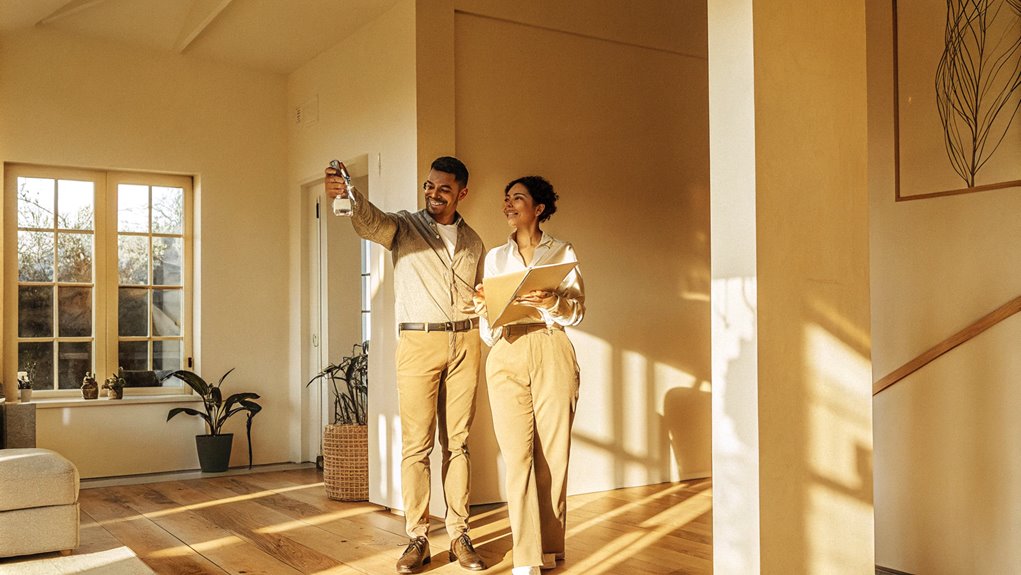
Building up money in your first home helps you buy better homes later. When your home grows in value, you get more money to use for your next home.
A starter home can grow 15-20% in five years. This gives you $40,000 to $60,000 more to spend.
A townhouse can grow 20-25% in five years. This gives you $60,000 to $80,000 more to spend.
A single family home can grow 25-30% in five years. This gives you $80,000 to $120,000 more to spend.
A fancy home can grow 30-35% in five years. This gives you $120,000 or more to spend.
The more your home grows in value, the more choices you have for your next home.
Local Market Growth Benefits
When you buy a home in a growing area, you can make money as house prices go up.
First-time buyers can get help with money for their down payment – up to $10,000 in some cases.
As more people move to an area, the town gets more tax money. This means better schools and roads.
All of this can make your home worth more each year.
Rising Neighborhood Values
When you buy your first home in a growing area, you can make more money as the whole area gets better. Think of it like a wave – as more people want to live there, all the homes become worth more money.
Your home can grow in value by $15,000 to $25,000 each year if you pick the right spot. This is much more than homes in other areas, which only grow by $8,000 to $12,000.
New stores and bus stops make homes worth more money. When these pop up, nearby homes can sell for 10-15% more in just two years.
If you buy early in these growing areas, you win twice:
- Your home gets more valuable on its own
- The whole area gets nicer, which makes your home worth even more
The best part is that you're not alone – as your home grows in value, so do your neighbors' homes. This makes the whole area better for everyone.
First-Time Buyer Incentives
Buying your first home can be exciting, and there's help to make it easier! Many programs offer money to new homebuyers in growing areas. You can get special loans, help with down payments, and money back on your taxes.
| Program Type | What You Get |
|---|---|
| FHA Loans | Pay just 3.5% up front |
| State Programs | Up to $10,000 for down payment |
| Tax Credits | Up to $2,000 back each year |
| Local Grants | $5,000-15,000 for closing costs |
When you use more than one of these programs, you can save a lot of money – often 20-30% of your costs. Living in a growing area is smart too. As the area gets better, your home could be worth more money later.
Strong Property Tax Base
Your first home can grow in value when you pick a place where people pay their taxes on time. This helps your whole neighborhood stay nice. When people pay taxes, the town can keep up good schools, parks, and streets. This makes more people want to buy homes there.
Good things happen in areas where:
- Most people pay their taxes (95 out of 100 homes)
- Homes go up in price by 4-6% each year
- Schools get a big share of tax money
- Stores and shops help pay taxes too
Before you buy, look at how the town uses tax money. Pick a spot where taxes help make the area better. This way, your home will be worth more when you want to sell it.
Debt-to-Income Ratio Advantages
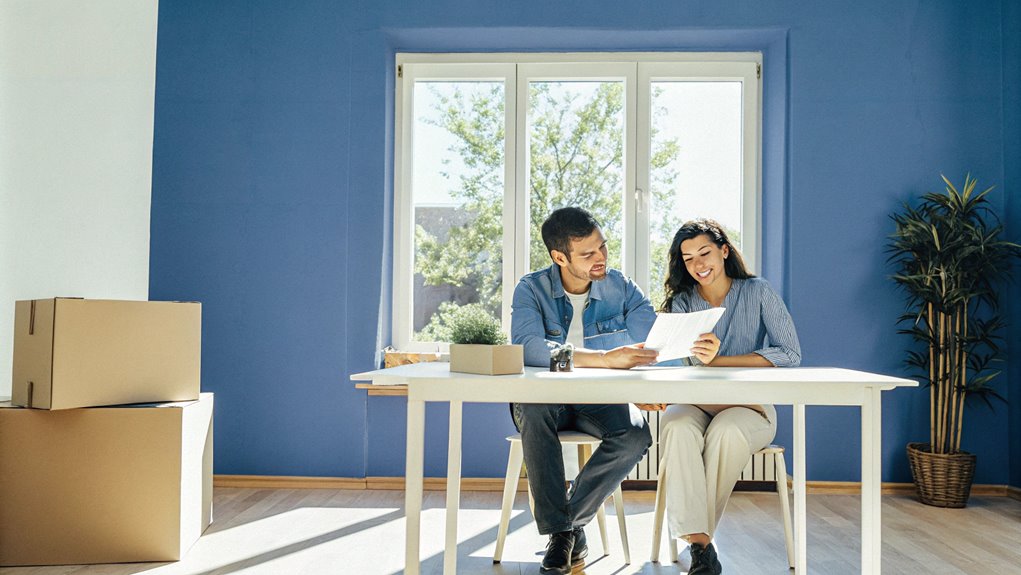
Your money matters when buying your first home. A lower debt score helps you get better deals on home loans. Think of it like a money health score – the lower it is, the better!
Here's what different scores mean:
- Score under 36: You get the best deals
- Score 36-41: You get good deals
- Score 41-43: You pay more and need extra papers
- Score over 43: You might not get a loan
When you buy a small first home, you spend less each month. This means you can pay your bills and save money at the same time. It's smart to start small! Your monthly home payment should be less than 28% of what you make.
Starting with a smaller home helps you build good credit. Later, you can move to a bigger home when you're ready.
| Score | What It Means |
|---|---|
| Under 36% | Best rates, lots of choices |
| 36-41% | Good rates, normal process |
| 41-43% | Higher rates, more paperwork |
| Over 43% | Few choices, might not get loan |
Financial Freedom Through Smart Ownership
Owning your first home is like planting a money tree. When you buy a home, each payment helps you own more of it. The home usually grows in value too, just like a tree grows taller.
Think about it: Instead of giving money to a landlord, you keep it for yourself. This is how you start building your own wealth.
Here's what you can do with your first home:
- After living there for a few years, you can use the value of your home to buy a bigger one. You can also borrow money at a better rate than most other loans.
- You can rent out your home. Someone else will pay your costs, and you'll get extra money each month.
- If you stay in the home for five years or more, you won't have to pay taxes on most of the money you make when you sell it. You can use this money to buy an even better home.

